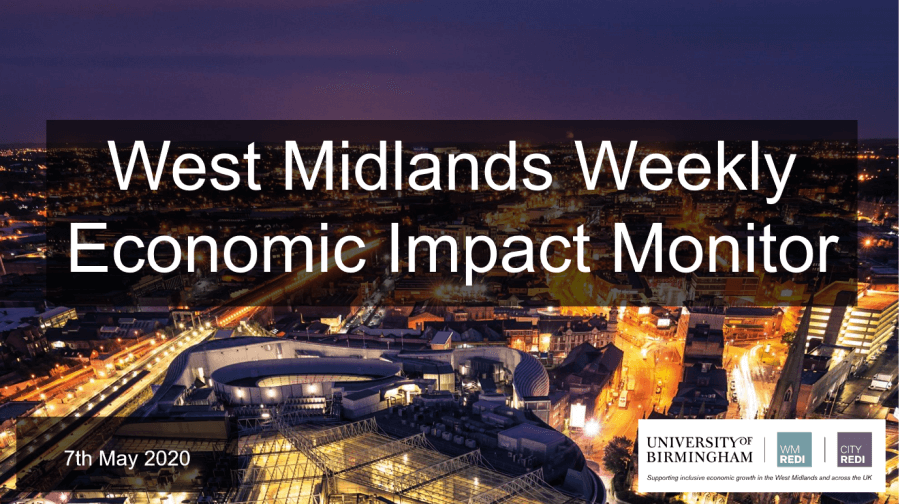 WM REDI has been tasked with providing an up to date monitor of the current COVID-19 economic impacts, on a weekly basis. These reports will help regional partners to shape responses and interventions to boost the region’s resilience so that it can thrive going forward. Each week the focus of the report is based on research and evidence published that week.
WM REDI has been tasked with providing an up to date monitor of the current COVID-19 economic impacts, on a weekly basis. These reports will help regional partners to shape responses and interventions to boost the region’s resilience so that it can thrive going forward. Each week the focus of the report is based on research and evidence published that week.
Key points:
- Forecasters are now coming to a general consensus they the UK is looking at a sharp fall and slower recovery over at least 2 years, with some sectors longer. There is a limited expectation of a consumer bounceback, as people have utilised spare cash and resources and are reluctant to take on debt. The prolonged international lockdown may change attitudes to what consumers value and need in the longer term, the effects of which we have yet to see emerge.
- Businesses are understandably reluctant to take on debt they may not be able to pay back, and bank lending processes are still an issue due to the length of time taken and the decision making processes. The new bounce back loans seem to have a higher interest. The furlough scheme is working well and making a difference to businesses and whether they can withstand the current crisis.
- We already have high youth unemployment in the region and low skills levels, which puts us at higher risk of longer-term scaring effects on our young people, where they take longer to get into the job market and into good jobs. This will have a significant effect on areas already suffering deprivation and inequality. In economic downturns, young people tend to stay in education, but the disruption in the education sector due to closure may put many off this alternative. Therefore the region’s young may be further disadvantaged.
- Businesses in the region need to diversify to be more resilient, evidence suggests that more diverse economies and businesses are better able to weather economic shock. Businesses are seeking greater support in how to do this, how they develop new products, services and markets and recovery planning should include funding to accelerate this.
- Levelling up is going to be a challenge, as London and the SE have a more resilient economy, and poorer areas are going to be hit harder. There needs to be clearer devolution, with powers and funding, to support local areas tackle the levelling up agenda.
- Businesses are also seeking clear guidance on how to return to work in a social distancing based economy. How do they ensure the safety of workers, visitors and customers in workplaces built for closer working and what will be their duty as an employer?
- As more forecasts are being published, they are highlighting the issues facing the university sector. The West Midlands, due to education’s relative size in the economy may be disproportionately affected.
Before the onset of COVID-19, the West Midlands region was in a period of significant growth, based on a burgeoning construction sector; a thriving city centre international business and professional services sector also driving high levels of business tourism; a manufacturing base becoming more productive and an automotive sector responding to the challenge of a carbon-neutral future; high exports, foreign direct investment and strong international links, and the biggest higher education cluster outside London. All powered by a young workforce. However, underlying this growth there were significant issues with inequality, poverty, youth unemployment, low skills, poor health and school performance.
COVID-19 could exacerbate our weaknesses and undermine our assets. This means we need to protect our assets and ensure they survive and then build their recovery on a resilient infrastructure, which encourages diversifying and supporting local growth, employment and supply chains. At the same time, we need to develop new ways of working internationally in a tech-based future.
The weekly monitor brings together data and intelligence from the WM REDI partnership into one single source which can be shared and utilised in planning and responding to the challenge of the virus. This is a rapid review of the issues. It is not intended to be a comprehensive assessment but rather a practical report which places emphasis on emerging issues and the best data and intelligence we have to date.
The monitor is feeding into the regional recovery plan that can help the regional economy bounce back and quickly move forward once lockdown restrictions start to be lifted.
The work is being endorsed by political and business leaders a task force of experts are being set up through WM REDI partners to better understand the impact of the lockdown and what measures will be needed to get the economy moving again.
Download and view a copy of the West Midlands Weekly Economic Monitor.
City-REDI / WM REDI have developed a resource page with all of our analysis of the impact of Coronavirus (COVID-19) on the West Midlands and the UK. It includes previous editions of the West Midlands Weekly Economic Monitor, blogs and research on the economic and social impact of COVID-19. You can view that here.
This blog was written by Rebecca Riley, Business Development Director, City-REDI.
Disclaimer:
The views expressed in this analysis post are those of the authors and not necessarily those of City-REDI or the University of Birmingham.
To sign up to our blog mailing list, please click here.
